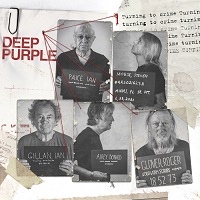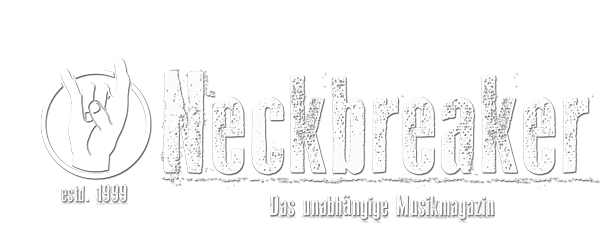
Now DEEP PURPLE have been in the music business for such a long time and you would think they had already met all kinds of challenges. But for their latest album "Turning To Crime" there was a bigger challenge waiting for them... their own four walls and home recording. I had the pleasure of speaking with bassist Roger Glover about the process. How the band arranged the songs over distance and discovered enthusiasm in the process and why they were in Peter Gabriel's studio, you'll be able to read in the following interview!
Sarah-Jane: "Turning To Crime" is the album name - do you still think it is a crime?
Roger Glover: Well we believe we’re innocent. But other people have different opinions. We’re not stealing songs, we’re just borrowing them, messing around with them and giving them back. We’re not guilty, your honor. Someone asked Ian Gillan during the lockdown last year “now you can’t tour anymore and can’t go out” and he said “I’m turning to crime”. The name was kinda stuck. So as we figured out how to name the album, he suggested that one. And the record company just jumped on it, they loved it, because it had a theme.
Sarah-Jane: Which of your suggested songs made it onto the album?
Roger Glover: “7 and 7 Is” is the first one I suggested. And “Watching the River Flow”, I always loved that song. And “White Room”, I thought we could do a Cream song. I think I suggested 4 or 5 songs. The thing is the songs we suggested individually, they’re the ones we did the demos for. To make a demo at home, ship it to the rest of the band and they can add their part to it. And it was really an experiment. We didn’t know it worked that well.
Sarah-Jane: Can you describe the process of the album production?
Roger Glover: Ian Gillan was the only person in the band who didn’t have a home studio. And a home studio is really nothing more than a computer and a few other things. Technology is really great in these days, because it makes life so easy. Don, Stevie and myself we did the demos for all of them. We decided to not just copy songs, we wanted to take them to another place. Add things, rearrange them, put solos in them where no solos existed. It became a fun exercise to make a demo. And you just bang it out with a drum machine with a ruff chord sequence, so everybody knows where it is. And we send it to Bob Ezrin in Nashville and he was the one who was the nerve center. The exciting part was when you were writing an idea for a song that is maybe a slightly different to what the songs is, you have no idea what the other people are gonna play. So it’s really exciting to hear it coming back to you. The first thing really hit me was the drums. Paice has a really good drum set at home. “7 and 7 is” was one of the first songs we did. He put the drums on it and when he came to me I thought he did a great job. Because recording at home is not easy. Since Ian Gillan had no home studio, we were trying to get a studio somewhere. We wanted to use Hamburg, but covid stepped in and said no. So we had to wait until things eased up a bit. We wanted to find a quiet studio somewhere. Bob Ezrin called Peter Gabriel, who he produced before, and he said “hey we could use your studio”. So it was quite special to go to Peter Gabriel’s place, he wasn’t there of course. Me and Ian Gillan, we spent four days to record the vocals. So the rest of us were separate, we didn’t get together.
Sarah-Jane: Isn’t that strange to create music like that today. You don’t have to be in the same room.
Roger Glover: Yeah! While we couldn’t go on tour, we thought we have to do an album- but we couldn’t do an album, because who is going to write the songs? We write together, we have to be together to write, because they don’t come from jam. The songs kinda evolve from the jamming. So when we can’t jam, the song can’t evolve.
Sarah-Jane: "Caught In The Act" is a great ending and it seems like you had a lot of fun with your project. How did you decide on the songs?
Roger Glover: We had some sort of tradition playing live. When we got off stage and walk on stage, Don would started to play something he usually started with “Going Down” (Freddie King) or Green Onions (Booker T & The M.G.s). So as you’re getting your guitar on, walking on stage and thanking the crowd, we jam around before were getting back to “Hush” or “Smoke On The Water”. Also Steve, before he did smoke on the water, he reminded people of all the great riffs and bands, but we did Led Zepplin or ZZ Top and AC/DC or whatever. We thought why don’t we just legalize that and put them all into a medley? Don did the arrangement for that.
Sarah-Jane: That’s why I’m saying you can hear the fun out of that.
Roger Glover: You’ve hit the nail on the head. It’s a fun album! Not to be taken too seriously, to be taken with a pinch of salt. And actually we wanted to release the album in the summer to cheer the world up. It seemed like a summer album, but covid kinda stopped that, they couldn’t rush it out. Now it’s a winter album, warm your heart up
- Sometimes it’s a piece of wood that I hang around my neck and I wonder what’s it’s for. -
Sarah-Jane: How do you still challenge yourself with your instrument after all these years?
Roger Glover: Oh believe me I’m challenged with my instrument every day. Sometimes it’s a piece of wood that I hang around my neck and I wonder what’s it’s for. But actually the challenge is the sound. Getting a base sound is easy, but at home I have limited stuff. I have one amplifier, I have three guitars, one of them wasn’t really good. So trying to find the right sound – I’m still not sure if I found the right sound. But I did it anyway, somehow. And when you’re working to a click track or a drum machine it’s a tendency to be perfect, because that’s perfect and I think what we did manage to achieve is to play not perfect – you know what I mean. It sounds live, because it’s human. It’s not metronomic.
Sarah-Jane: What’s your favorite song to play on the base? What makes it so special?
Roger Glover: It’s hard to say, it’s changing every day. My favorite of today is “Watching the River Flow”. ‘Cause I did the demo for that and I wanted to do it differently to the Bob Dylan version, which is kinda a slow blues. I wanted to try it a bit faster. Actually Dylan used to it incredibly fast on stage and that was too fast. So I came up with that idea of doing a kind of ska beat, I love all kind of music and ska as well. I did a demo and sent it to Ian Paice and he said “I’m not playing ska. I’m a rock player.” Then Bob Ezrin jumped into the conversation and he said “maybe Roger can do a walking base with a fast rock rhythm” and I did enjoy playing it, I have to say. It was a lot of fun. And I think coming from skiffle that walking base thing is coming second nature to me. Because skiffle is only two notes and if you take that one stage further, it’s pretty basic. I’m not a twiddler, I’m a thumper.
Sarah-Jane: You are the roots of rock, among other things. Do you think it's important for older and younger musicians to interact?
Roger Glover: All I can say is when we were growing up, no one taught us anything. We just had heroes and songs that we liked. I’m old enough to know what was life before rock n roll – and it was reeaaally booring. The songs were cruelness and novelty songs. And Britain back then was still grieving from World War II. The older generation wanted to return to what was life before the war, like now, we can’t ever go back. As I was growing up I didn’t listen to a lot of music, because it was so boring. But at the age of 10 the pre rock n roll happened. It was lively and infectious and the songs weren’t about (singing voice) “I love you darling, ‘cause you’re so nice”. It was prison and slavery and work and poverty, real life. And that was wooow this is what real life is about, not that kinda fancy violence stuff. It was homemade music, if you had three chords, you were better than people with two chords. And then rock n roll, came and run over the hills, it was an invasion. It was a treasure chests of great songs. I fell in love with that and I thought “how do they write songs like that?”. So I wanted to write songs and as I was 13 I wrote my first song. I was always a songwriter, but no one taught me. That is the responsibility for young people to find out for themselves and learn their own way. They are gonna be different anyway, ‘cause they’ll rebel against whatever what we say.



